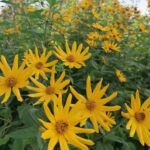Dear Fellow Gardeners,
I can’t believe how fast this year is going. It has been an exciting year with lots of new and exciting projects.
Online Polytunnel Course (NOTS)
The online Commercial Organic Polytunnel Course, organised by the National Organic Training Skillsnet (NOTS) was a great experience this year with over 500 participants who joined us for the entire growing season.
It would be great if some of the participants will start a small-scale horticultural enterprise. This could help alleviate Ireland’s dependency on imported fruit and vegetables. We still import 70-80% of our fruit and vegetables while we have the potential to grow crops for millions of people.
NOTS is currently looking for a new grower with a commercial sized polytunnel in the North West where we could do the filming for next year’s course. Please contact me on [email protected] if you are interested.
L’Arche Project in Cork
Another interesting project I’m involved in is the L’Arche Project in Cork. It’s a very exciting place working with special needs people. I’m helping to design this therapeutic garden which includes a circular sensory garden, a community garden, wildlife garden and link it all to a new café. They are actually looking for a full-time gardener whose responsibility would be to manage the garden on a day-to-day basis and also work with various groups of people. If anyone is interested please send me an email on [email protected]
My own online gardening course with Assumpta Butler at the Community Gardens in Bundoran was a new venture this autumn. We’ll continue in early spring with a weekly online gardening course.
You can now book it on our website. It may also make a nice Christmas present for an interested gardener.
Online Gardening Course with Klaus Laitenberger and Assumpta Butler
Spring Session
Duration:
10 sessions (45 minutes) from Saturday 19th February 2022 to 7th May 2022 plus three live Q&A sessions
Cost: €70 for entire course
You can watch the videos whenever it suits.
We are more than half-way through our online autumn/winter gardening course and are just launching our spring online gardening course which will start on Saturday 19th February 2022 until the 7th May 2022.
The 10 weekly sessions will take place in the Community Gardens in Bundoran and Assumpta will join me again and will keep everything well organised.
The entire course costs €70 (includes 10 online sessions and 3 Q&A sessions via zoom).
You can book the course now by clicking on the following link:
Online Gardening Course with Klaus Laitenberger – Spring Session – Green Vegetable Seeds
This is a very practical course and is aimed at complete beginners and more advanced gardeners alike. It will cover seed sowing, bed preparation, many basic gardening skills, some theory and most importantly you’ll see how we sow and grow a wide range of crops outdoors and in the greenhouse.
Here are the proposed dates. A link will be sent to you for each date. Don’t worry if you can’t watch the videos on the date of release – you can watch them at any time that suits you.
19th February
5th March
12th March
19th March
26th March
2nd April
9th April
23rd April
30th April
7th May
During the course we will also have 3 live online zoom Q&A sessions (dates will be announced)
Each session is about 45 minutes long. The sessions are filmed live and will cover what to do in the garden in each week. Any questions can be emailed to me on this dedicated email address [email protected]
BIOFARM conference
One of the profound talks at this year’s NOTS Biofarm conference was Dr. Christine Jones’ talk on soil carbon. If you contact [email protected] you may still get access to it. This talk resonated with me and I would like to share a few points she made with you.
- Nitrogen fertilizer is mobile and only 10-40% is absorbed by plants while 60 -90% causes environmental pollution.
- The production of artificial nitrogen fertilizer emitted 1,250 million tons of CO2, while the global commercial aviation industry emitted 900 million tons of CO2 (2018 figures).
- Diversity – grow as many different crops as possible – a grass field should be composed of at least 16 different crops in 4 different groups – 4 grasses, 4 legumes, 4 small herbs and 4 larger herbs.
These were just couple of important points she made and the conclusion should be that we really need to stop using artificial nitrogen fertilizers.
Let’s rely on legumes which will fix atmospheric nitrogen and use compost and composted manure and also grow as diverse as possible.
Happy Gardening
Klaus



